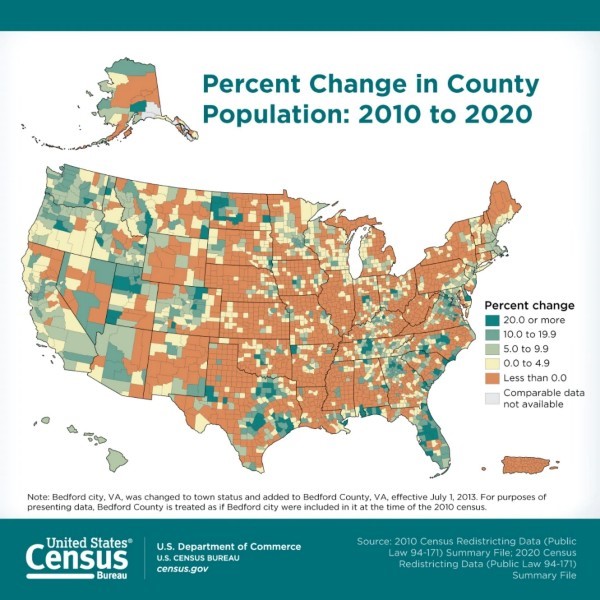Rural counties getting Rural-er
Newly released data released from the 2020 Census continues to confirm a trend of an aging and urbanized United States. Data and maps released earlier this month showed over half the counties in the U.S. lost population over the last decade, predominantly in rural counties.

As rural areas lose population they also lose power and influence in State governments and in Congress. States will use the new data to re-configure congressional districts which will likely result in urban areas increasing their representation in government. Besides a loss of political clout, rural communities simply find it harder to survive with fewer people to support schools, police, hospitals, and other businesses. Farms and ranches, already confronting a shrinking labor force, will need options for replacing workers which could include immigrants and automation. Quite simply, fewer people in rural America means less of everything – especially opportunities. The trend raises a number of policy issues, ranging from economic viability of rural areas to effective representation in Federal and State government.
Arkansas State Plant Board facing new challenge to composition
New amendments to the law specifying how members are selected to the Arkansas State Plant Board are facing a court challenge alleging that the new amendments did not cure the problem of appointments by private entities and associations. As we reported previously, the Arkansas Supreme Court decided that 9 members of the Arkansas State Plant Board (ASPB) were unconstitutionally appointed by private industry. That case was brought by a group of soybean & cotton producers that disagreed with the Plant Board’s rule restricting the use of dicamba herbicides. Shortly before the Supreme Court’s decision, the Plant Board law was amended to allow the 9 private associations to make recommendations to the Governor, who in turn would use the recommendations to appoint a member to the Board with confirmation of the appointment by the State Senate. According to the new lawsuit, the new amendments “did not cure the constitutional violations noted by the Supreme Court . . . as private entities were given the exclusive right to nominate half the seats on the ASPB.”
Cape Law Firm’s Frequently (or Randomly) Asked Questions
Do I have to file a new Trademark application if I update my brand?
Not necessarily. Sometimes a trademark owner decides that a logo or brand needs a “refresh” if it has been around for a while. Instead of filing a new trademark application for the refurbished logo, you may be able to amend the registration for the old logo and keep its original priority date for the refreshed one. The ability to amend an existing trademark registration depends on whether the new logo is a “material alteration” of the original. In other words, is the commercial impression of the old and new logos the same? Minor changes to the size, style, or deletion of generic material would likely be permitted in an amendment to an existing registration.




